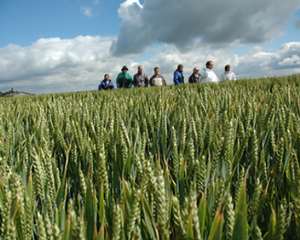
The Crop Research Institute (CRI) of the Council for Scientific and Industrial Research (CSIR) in collaboration with the Lancaster University has began the implementation of the Water For Food Project for rice production in Ghana.
Dr. Stephen Yeboah, a crop research scientist of the CRI and project team leader, disclosed that, the four year project which commenced in January 2018 is aimed at developing a technology to ensure the efficient management of water and crop nutrients application in rice production.
The researcher said the "Alternate Wetting and Drying" technology that the Council in partnership with the Lancaster University is developing will help increase crop yield whilst limiting the demand of water for irrigation in rice cultivation.
Dr Yeboah pointed out that water management has become the necessary means of ensuring sustainable agricultural productivity in order to achieve food security in the country in particular and the world at large.
He indicated that the current universal statistics on water is alarming and fast becoming a threat to global agricultural productivity especially the rice venture which demands large volumes of water hence the need to adapt the water management approach.
He argued that about 70 percent of the world's water resource is used for agricultural purposes which if not checked will have negative impact on global food security in the near future, as a result, research institutions and scientists need to develop a farming technology which can address the challenge.
Dr. Yeboah indicated that the over application of crop nutrients such as nitrogen fertilizer with the aim of increasing rice yield has negative consequences on the environment.
"In this regard, that the Water for Food Production project is also aimed at reducing green house gasses emissions such as nitrous oxide and methane though optimise nutrient application technology", the researcher disclosed.
He explained further that, soil microbes that feed on the applied crop nutrients (fertilizers) emit nitrous oxide and methane gasses adding, "the more these microbes feed on much fertilizer, the more green house gasses emitted into the environment".
He said the nutrients management aspect of the technology will serve both economical and environmental purposes, thus reducing the quantity of nitrogen fertilizer wastage in order to achieve low carbon while promoting green growth for a healthy environment for a healthy society.
Dr. Stephen Yeboah is therefore optimistic that the Water for Food Production technology, as a component of the RECIRCULATE project will help address the high demand of water and crop nutrients in the production of the cereal.




 Critics fear Togo reforms leave little room for change in election
Critics fear Togo reforms leave little room for change in election
 Flooding: Obey weather warnings – NADMO to general public
Flooding: Obey weather warnings – NADMO to general public
 Fire in NDC over boycott of Ejisu by-election
Fire in NDC over boycott of Ejisu by-election
 NDC to outdoor Prof Jane Naana Opoku-Agyemang as running mate today
NDC to outdoor Prof Jane Naana Opoku-Agyemang as running mate today
 Ejisu: CPP seeks injunction to stop April 30 by-election
Ejisu: CPP seeks injunction to stop April 30 by-election
 Dismiss ECG, GWCL, GACL bosses over losses – United Voices for Change tells gov’...
Dismiss ECG, GWCL, GACL bosses over losses – United Voices for Change tells gov’...
 Submit 2023 audited financial statements by May – Akufo-Addo order SOEs
Submit 2023 audited financial statements by May – Akufo-Addo order SOEs
 Current power outages purely due to mismanagement – Minority
Current power outages purely due to mismanagement – Minority
 ECG hoists red flag to fight Ashanti Regional Minister over arrest of General Ma...
ECG hoists red flag to fight Ashanti Regional Minister over arrest of General Ma...
 Mahama’s 24hr economy will help stabilise the cedi; it’s the best sellable polic...
Mahama’s 24hr economy will help stabilise the cedi; it’s the best sellable polic...
